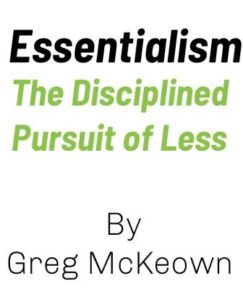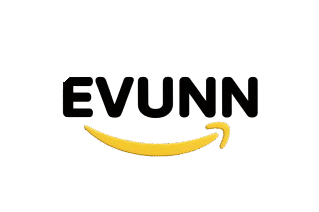Zero to One Summary
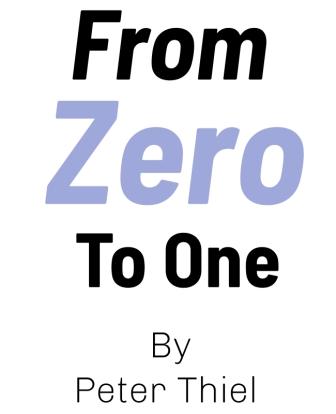
Differentiate, find an untapped market. Don't die in a saturated market
Why We Recommend this Book
This book has changed the way entrepreneurs, startup founders, and innovators think about business. It has:
- Helped founders like Elon Musk and Brian Chesky (Airbnb) create category-defining companies.
- Inspired countless startups to focus on monopoly power rather than just competing on price.
From Zero to One
Zero to One Summary
Got a million things on your to-do list? Same here.
But what if I told you that From Zero to One could change the way you think about business—forever?
Don’t worry, we’ve got you covered. We’ve broken down the book into a quick, easy-to-digest summary so you can grab the golden nuggets without the time crunch.
Give this From Zero to One summary a read, and if it sparks something big, dive into the full book or listen to Zero to One audiobook.
Let’s turn your next big idea into something the world’s never seen before!”
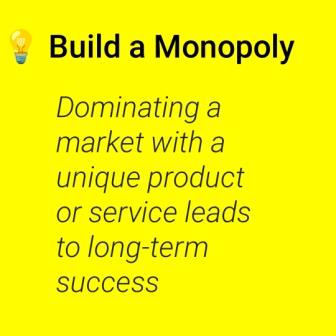
Introduction
Are you ready to create something truly revolutionary? From Zero to One by Peter Thiel is a bold manifesto for anyone who wants to build the future.
Whether you’re an entrepreneur or innovator, this book challenges you to move beyond simply copying what already exists (going from 1 to n) and instead invent something entirely new (going from 0 to 1).
Thiel, a co-founder of PayPal and one of Silicon Valley’s most visionary thinkers, shares his unconventional wisdom on what it takes to create breakthrough businesses.
Is Zero to One a good read?`
Zero to One by Peter Thiel has been recommended and praised by several influential entrepreneurs and billionaires like Elon Musk (founder of Tesla & SpaceX), Mark Zuckerberg (founder of Facebook/Meta) and Reid Hoffman (co-founder of Linkedin)
With insights from his own journey and other success stories, the book reveals why competition is overrated, how monopolies foster innovation, and why thinking for yourself is your greatest asset.
Reading this summary will give you the key takeaways, but trust us, the full book is an eye-opener.
It’s packed with fresh ideas and practical advice to help you shape industries and redefine success. Don’t just dream about the future—read From Zero to One and start creating it.
Click on the Tabs Below to Read From Zero to One Summary
What does Zero to One teach you?
Here is Zero to One in one sentence:
Peter Thiel teaches readers how to create groundbreaking innovations and build successful businesses by thinking differently, embracing monopoly strategies, and moving beyond competition to shape the future.
From Zero to One is ideal for:
Aspiring Entrepreneurs: If you dream of starting a business, this book will help you think differently, encouraging you to create innovative solutions rather than copying existing ones.
Startup Founders: It offers practical advice on building a monopoly, scaling a business, and standing out in competitive markets.
Business Professionals: Anyone in leadership, product development, or strategic planning will gain insights into fostering creativity and driving growth.
Students of Innovation: If you’re curious about what makes companies like PayPal, Facebook, and Tesla succeed, this book provides an insider’s perspective.
Investors: Learn to identify the unique qualities of businesses that have the potential to dominate entire industries.
Anyone Looking to Think Differently: This book is perfect for people who want to break free from traditional thinking and explore unconventional paths to success.
Whether you’re launching your first venture or simply want to adopt a more innovative mindset, From Zero to One will inspire and guide you.
Why you should read it
From Zero to One will challenge your conventional thinking and provides a fresh perspective on building groundbreaking businesses.
This book isn’t just about starting a company; it’s about creating something truly unique and valuable that transforms industries and shapes the future.
Peter Thiel distills his experience as a billionaire entrepreneur and investor to offer actionable insights, like why competition is a trap, how to dominate markets, and why you should aim to solve problems no one else is addressing.
Zero to One summary sparknotes:
Chapter 1: The Challenge of the Future
Main Idea: To build the future, you need to innovate, not just improve existing ideas.
Thiel begins with the concept of moving from “zero to one.” Going from zero to one represents creating something entirely new, while going from one to n is about incremental improvements or copying things that already exist. It’s about scaling or replicating an existing idea rather than creating something entirely new.
Zero to One Examples:
Example 1: Consider the leap from typewriters to computers. That’s zero to one. Simply improving the typewriter is one to n.
Example 2: If you open another fast-food restaurant like McDonald’s with similar offerings, you’re going from 1 to n—you’re replicating an existing idea.
Example 3: When the first car was invented, that was going from 0 to 1. It was a completely new concept that didn’t previously exist.
Key Takeaway: True innovators look at problems in new ways. Don’t just copy; invent.
Peter Thiel emphasizes that true innovation—the kind that drives long-term success—comes from going from 0 to 1, as it creates something unique and valuable that can lead to monopolistic success.
Chapter 2: Party Like It’s 1999
Main Idea: The dot-com bubble taught us lessons about over-hyped competition and misguided growth strategies.
During the 1990s, many companies focused on rapid growth without creating real value, which led to the tech bubble burst.
Example: Pets.com grew quickly but failed because it lacked a strong foundation or a unique value proposition.
Key Takeaway: Avoid hype. Focus on building a solid business with a clear, valuable offering.
Chapter 3: All Happy Companies Are Different
Main Idea: Monopoly is the goal of every successful business.
Thiel argues that monopolies (companies that dominate their market) create long-term value, while competition erodes profits.
Example: Google dominates search because it’s fundamentally better, not because it has more competitors.
Key Takeaway: Don’t compete; create a monopoly by offering something so unique and valuable that customers can’t go anywhere else.
Chapter 4: The Ideology of Competition
Main Idea: Competition limits innovation.
When companies compete fiercely, they focus on beating each other rather than creating something new.
Example: Restaurants on the same street often compete with identical menus and pricing, leaving little room for uniqueness.
Key Takeaway: Break away from competition by doing what others can’t or won’t do.
Chapter 5: Last Mover Advantage
Main Idea: The goal isn’t to be the first; it’s to be the best and last in your category.
Being a “first mover” isn’t enough. Companies must also create sustainable businesses with a long-term vision.
Example: Google wasn’t the first search engine, but it was the first to master it and become indispensable.
Key Takeaway: Focus on building a product or service that stands the test of time.
Chapter 6: You Are Not a Lottery Ticket
Main Idea: Success is not random—it requires deliberate planning and action.
Thiel criticizes the idea of relying on luck for success. Entrepreneurs should think critically, act boldly, and take control.
Example: Elon Musk didn’t leave Tesla’s success to chance. He meticulously planned and executed his vision.
Key Takeaway: Don’t leave your future to luck; create it with a clear plan.
Chapter 7: Follow the Money
Main Idea: Successful startups focus on a big market with a clear path to profitability.
Thiel discusses the importance of understanding your market and scaling strategically.
Example: PayPal started with niche markets but expanded to dominate online payments.
Key Takeaway: Begin with a focused market, then scale strategically to capture more.
Chapter 8: Secrets
Main Idea: The world is full of secrets, and success comes from uncovering and leveraging them.
Thiel emphasizes that great businesses are built on insights others miss.
Example: Airbnb discovered the “secret” that people were willing to rent out their homes, even though others doubted the idea.
Key Takeaway: Find the hidden opportunities that others overlook.
Chapter 9: Foundations
Main Idea: Startups need a strong foundation, including the right people and structures.
Building the right team is critical. Employees and founders should share a vision and work cohesively.
Example: Facebook thrived because Mark Zuckerberg built a culture of shared purpose early on.
Key Takeaway: Build a team that aligns with your vision and works well together.
Chapter 10: The Mechanics of Mafia
Main Idea: Great companies feel like a tight-knit “mafia.”
Thiel discusses the importance of creating a strong company culture where employees feel united by a mission.
Example: PayPal’s team was so strong that its former employees went on to build Tesla, LinkedIn, and YouTube.
Key Takeaway: Build a culture where everyone is deeply committed to the mission.
Chapter 11: If You Build It, Will They Come?
Main Idea: Marketing and sales are as important as the product.
Even the best product won’t sell itself; you need a strategy to reach your audience.
Example: Tesla’s success isn’t just about cars—it’s about Elon Musk’s storytelling and marketing genius.
Key Takeaway: Never underestimate the power of marketing and sales.
Chapter 12: Man and Machine
Main Idea: Technology should complement human abilities, not replace them.
Thiel argues for partnerships between humans and machines rather than full automation.
Example: Palantir uses AI to help humans analyze data more effectively rather than replace analysts.
Key Takeaway: Build technology that enhances human capabilities.
Chapter 13: Seeing Green
Main Idea: Sustainable innovation is key for long-term success.
Thiel discusses how green technologies can succeed if they create real value rather than being driven by trends.
Example: Tesla succeeded because it built superior cars, not just because they’re electric.
Key Takeaway: Focus on creating lasting value, not just following trends.
Chapter 14: The Founder’s Paradox
Main Idea: Founders are both strengths and weaknesses for startups.
Thiel explains how founders often have extreme personalities that can drive success or create challenges.
Example: Steve Jobs’ perfectionism propelled Apple but also created friction.
Key Takeaway: Embrace the founder’s role but be mindful of potential pitfalls.
Conclusion: Building the Future
Main Idea: Innovation requires courage, vision, and a willingness to think differently.
Thiel encourages readers to build the future by creating something entirely new rather than copying existing ideas.
Example: SpaceX revolutionized space travel by tackling problems no one else dared to solve.
Key Takeaway: Dare to innovate and create something the world has never seen before.
Final Thoughts
From Zero to One is a guide for anyone looking to build a meaningful, lasting business. It’s not just about startups—it’s about approaching problems with fresh ideas, challenging the status quo, and shaping the future.
Whether you’re an entrepreneur or simply looking to think differently, this book will inspire and equip you to make bold moves.
1.Focus on Solving Unique Problems or same problems in unique ways
What to Do: Identify problems that no one else is solving or solve them in a completely new way.
How to Go About It:
Observe gaps in the market where customer needs aren’t met.
Brainstorm ideas that could offer a 10x improvement over existing solutions.
Ask yourself: “What valuable company is nobody building?”
2. Think Like a Monopoly
What to Do: Aim to dominate a niche before expanding to broader markets.
How to Go About It:
Start small and focus on owning a specific market segment.
Avoid entering saturated markets with heavy competition.
Example: Instead of launching a generic e-commerce platform, target a niche like high-quality, sustainable children’s toys.
3. Avoid Competition
What to Do: Create a business so unique that you have no direct competition.
How to Go About It:
Analyze your competitors and differentiate your product or service.
Focus on innovation, not imitation.
Example: Develop proprietary technology or offer a product/service that can’t be easily replicated.
4. Develop a Strong Vision
What to Do: Have a clear, long-term vision for your business.
How to Go About It:
Write down your goals and articulate what success looks like in 5-10 years.
Share your vision with your team and align everyone’s efforts toward it.
Focus on building something timeless rather than chasing trends.
5. Build a Team of Missionaries, Not Mercenaries
What to Do: Hire people who believe in your vision, not just those looking for a paycheck.
How to Go About It:
When hiring, prioritize passion and alignment with your mission over skills alone.
Create a company culture where employees feel ownership and purpose.
6. Start Thinking in Terms of “Secrets”
What to Do: Look for hidden opportunities in the world.
How to Go About It:
Reflect on questions like: “What is something I believe to be true that most people don’t agree with?”
Explore industries or markets that others overlook.
Example: Think about future needs (e.g., renewable energy or AI) that aren’t fully developed yet.
7. Build for the Future
What to Do: Focus on long-term sustainability, not just short-term gains.
How to Go About It:
Invest in innovation that provides durable competitive advantages.
Avoid following fads or trends that won’t last.
Example: Build a product or service that becomes essential over time, like Google’s search engine.
8. Leverage Technology for Leverage
What to Do: Use technology to scale your business.
How to Go About It:
Automate repetitive tasks to save time and resources.
Incorporate innovative tools to create efficiency and scalability.
Example: Use AI for customer support or data analysis to better serve your audience.
9. Embrace First-Mover Advantage (But Do It Right)
What to Do: Enter new markets early but build a moat to protect your position.
How to Go About It:
Be the first to innovate, but ensure your idea is defensible (e.g., through patents or unique technology).
Focus on continuous improvement after entering the market.
10. Think Exponentially, Not Linearly
What to Do: Look for ideas with massive potential growth.
How to Go About It:
Explore industries with exponential growth opportunities, such as AI, renewable energy, or space exploration.
Avoid businesses that are easily capped in growth.
By implementing these steps, you can move toward creating truly unique, impactful businesses that stand the test of time. The key is to think differently, embrace innovation, and focus on the long-term vision.
Here are the best zero to One quotes:
“Brilliant thinking is rare, but courage is in even shorter supply than genius.”
Highlights the importance of boldness in entrepreneurship.
“The next Bill Gates will not build an operating system. The next Larry Page or Sergey Brin won’t make a search engine. If you are copying these guys, you aren’t learning from them.”
Emphasizes the need to create something entirely new, not replicate existing successes.
“Every moment in business happens only once.”
Stresses the uniqueness of opportunities and the importance of seizing them.
“Monopoly is the condition of every successful business.”
Explains that dominating a market with a unique product or service leads to long-term success.
“All failed companies are the same: they failed to escape competition.”
Underlines the danger of entering overcrowded markets without differentiation.
“If you want to create and capture lasting value, don’t build an undifferentiated commodity business.”
Warns against competing on price or following trends blindly.
“The most contrarian thing of all is not to oppose the crowd but to think for yourself.”
Encourages independent thinking rather than reactionary behaviour.
“A startup is the largest group of people you can convince of a plan to build a different future.”
Defines the essence of a startup as a collective working toward a shared vision.
“The best entrepreneurs know this: every great business is built around a secret that’s hidden from the outside world.”
Stresses the importance of unique insights that give companies a competitive edge.
“You are not a lottery ticket.”
Rejects the idea that success is purely about luck, advocating for deliberate planning and action instead.
“What important truth do very few people agree with you on?”
Challenges readers to identify unique perspectives that could lead to groundbreaking innovations.
“Long-term planning is often undervalued by our indefinite short-term world.”
Highlights the need for vision and strategy over immediate gratification.
“The perfect target market for a startup is a small group of particular people concentrated together and served by few or no competitors.”
Advocates starting small to build dominance before scaling.
“Progress comes from monopoly, not competition.”
Re-frames the perception of monopolies as drivers of innovation.
“Secrets are the answer to the future.”
Encourages seeking hidden opportunities that others haven’t yet uncovered.
“Brilliant thinking is rare, but courage is in even shorter supply than genius.”
Stresses the importance of bravery in pursuing groundbreaking ideas.
“If you lose sight of the fact that there are secrets to find, you will miss them entirely.”
Encourages curiosity and the belief that the world holds undiscovered opportunities.
“Monopoly is the condition of every successful business.”
Redefines the idea of monopolies as the ultimate sign of success in creating something unique.
“A bad plan is better than no plan.”
Urges entrepreneurs to take action rather than waiting for perfection.
“The most contrarian thing of all is not to oppose the crowd but to think for yourself.”
Highlights the value of independent thinking over simply rebelling against trends.
“The next Bill Gates will not build an operating system. The next Larry Page or Sergey Brin won’t make a search engine.”
Advocates creating new paths rather than copying past successes.
“The best startups might be considered slightly less extreme kinds of cults.”
Explains the strong, unified culture often necessary for a startup’s success.
“The lesson for entrepreneurs is clear: if you want to create and capture lasting value, don’t build an undifferentiated commodity business.”
Reinforces the importance of uniqueness in building a successful company.
“Every great company is unique because it solves a unique problem.”
Emphasizes the need for businesses to focus on specific, meaningful challenges.
“If everything worth doing has already been done, you may as well quit.”
Encourages optimism about the future and the pursuit of original ideas.
Here are books similar to From Zero to One:
The Power of Concentration by Theron Q. Dumont
Think and Grow Rich by Napoleon Hill
The Empire of Business by Andrew Carnegie
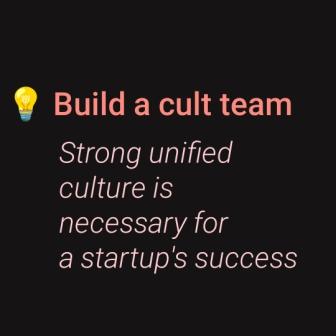
Peter Thiel is a renowned entrepreneur, venture capitalist, and co-founder of PayPal and Palantir Technologies.
He was the first outside investor in Facebook and has played a pivotal role in shaping Silicon Valley’s entrepreneurial landscape.
Thiel is a prominent advocate for innovation and disruptive thinking, often challenging conventional norms.
His unique perspective has made him a thought leader in technology and business strategy.
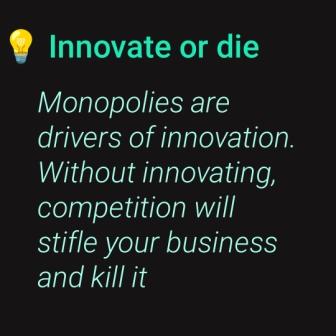
Course Curriculum
Test your Knowledge of Zero to One
-
Zero to One Quiz
Evunn Concept
From Zero to One and Blue Ocean Strategy by W. Chan Kim and Renee Mauborgne share this common concept:create new markets instead of competing in existing ones.
Zero to One teaches that the most successful businesses don’t improve on existing ideas—they create something entirely new ( going from “zero to one”).
Blue Ocean Strategy introduces the idea of “blue oceans”—untapped market spaces where competition is irrelevant, rather than “red oceans” where businesses fight over the same customers.
Key concepts in the two books:
- Avoiding direct competition and focusing on innovation.
- Creating monopolies or unique value propositions that make competition irrelevant.
- Building long-term success through differentiation.
Your Next Read
